
THE POPULAR ENCYCLOPEDIA OF BIBLE PROPHECY
PROPHETS
In the Bible, a prophet is a spokesperson for God, a person chosen and anointed to communicate His message to the people. This role goes beyond just predicting the future; it includes conveying God’s will, calling people to repentance, interpreting scripture, and sometimes performing miracles. The Hebrew term for prophet, “nabi,” means “spokesman,” and prophets were sometimes also called “seers” because they had spiritual insight.
Key meanings and roles of a prophet:
-
-
Prophets were often called “seers” because God granted them spiritual insight and a vision of what was to come.
-
They were tasked with explaining scripture, solving difficult problems, and clarifying God’s expectations for the people.
-
Moral and social critics:
Prophets often condemned individuals and nations for breaking God’s covenant and called people to repent from sin.
-
Divine messengers:
They conveyed messages of divine wrath, grace, and forgiveness to the people.
-
Miracle workers:
Some prophets, like Elijah, Elisha, and Jesus, performed miracles, such as healing the sick and raising the dead.
-
Future predictors:
While this was not their sole purpose, prophets did deliver prophecies about future events, including the birth of Christ and His second coming.
Key figures and types of prophets
-
Old Testament prophets:
Examples include Moses, Elijah, Isaiah, Jeremiah, Amos, and Jonah. Some were “writing prophets,” such as Isaiah and Daniel, while others were “non-writing prophets” like Elisha. There were also prophetesses such as Miriam, Deborah, and Huldah.
-
New Testament prophets:
In the New Testament, John the Baptist is a key example of a prophet who foretold the coming of the Messiah. The gift of prophecy is also mentioned as a spiritual gift distributed by the Holy Spirit, as described in 1 Corinthians 12
Bible Dictionary Prophets:
A biblical prophet was :
an individual chosen by God to serve as a spokesman, delivering messages and communicating his will to humanity. This role went beyond simply foretelling the future and included correcting moral abuses, calling people to repentance, and proclaiming God’s truth.
The prophetic office:
The prophetic office began informally with figures such as Enoch and Abraham, but became a distinct order with Samuel. Schools for training prophets were established at various locations, such as Ramah and Bethel, to prepare young men for this role. Notable prophets also include:
-
Moses, who acted as a prophetic prototype.
-
Miriam and Deborah, who served as prophetesses.
-
Elijah and Elisha, who addressed the kings and people of Israel.
Major and Minor Prophets
The prophets who wrote canonical books of the Bible are divided into two groups, though the distinction is based on the length of their writings, not their importance.
Major Prophets
These books are longer and cover a broader scope of material, including the most detailed prophecies concerning Jesus Christ.
-
Isaiah: Prophesied about judgment and salvation, including key prophecies of Christ’s virgin birth, sacrificial death, and return.
-
Jeremiah: Called people to repentance before the Babylonian exile and wrote about a future new covenant.
-
Lamentations: A book of poetic laments written by Jeremiah during the destruction of Jerusalem.
-
Ezekiel: Prophesied to the exiled people in Babylon, emphasizing God’s sovereignty and control over history.
-
Daniel: Lived and prophesied in Babylon, describing visions that point to God’s plans for redemption.
Minor Prophets
This collection consists of twelve shorter books that contain focused messages for their original audiences, as well as prophecies about Christ.
-
Hosea: Used his marriage to an unfaithful woman as a parable of God’s relationship with Israel.
-
Joel: Warned Judah of coming judgment and spoke of the future outpouring of the Holy Spirit.
-
Amos: Addressed social injustice and hypocrisy in Israel.
-
Obadiah: Delivered a message of judgment against the nation of Edom.
-
Jonah: A missionary story about God’s command to preach repentance to the people of Nineveh.
-
Micah: Predicted the fall of Samaria and the future desolation of Judah, also prophesying that the Messiah would be born in Bethlehem.
-
Nahum: Focused on God’s judgment against the city of Nineveh.
-
Habakkuk: Wrote a conversation with God about injustice and suffering, emphasizing that the righteous will live by faith.
-
Zephaniah: Announced God’s approaching judgment on Judah.
-
Haggai: Encouraged the people to finish rebuilding the temple after their return from exile.
-
Zechariah: Prophesied concerning the restoration of Jerusalem and the coming Messiah.
-
Malachi: Delivered prophecies about the coming of the Lord and the need for Israel to return to God.
Prophetic characteristics and functions
Biblical dictionaries highlight several roles and qualities of prophets beyond simple prediction:
-
Spokesperson for God: The Hebrew word nabi suggests a person who “bubbles forth” or utters a message from God.
-
Social and Moral Reformer: Prophets frequently challenged Israel’s rulers and people to correct religious abuses and live according to God’s law.
-
Messenger of Warning and Hope: They delivered messages of coming judgment for unfaithfulness while also proclaiming hope for future restoration and salvation.
-
Intercessor: Prophets pleaded with God on behalf of the people.
-
Symbolic Communicator: Some prophets performed symbolic acts to illustrate God’s messages.
-
Confirmer of Christ: New Testament writers viewed the Old Testament prophets as foundational to the Christian faith, testifying to the coming of Jesus as the Messiah.